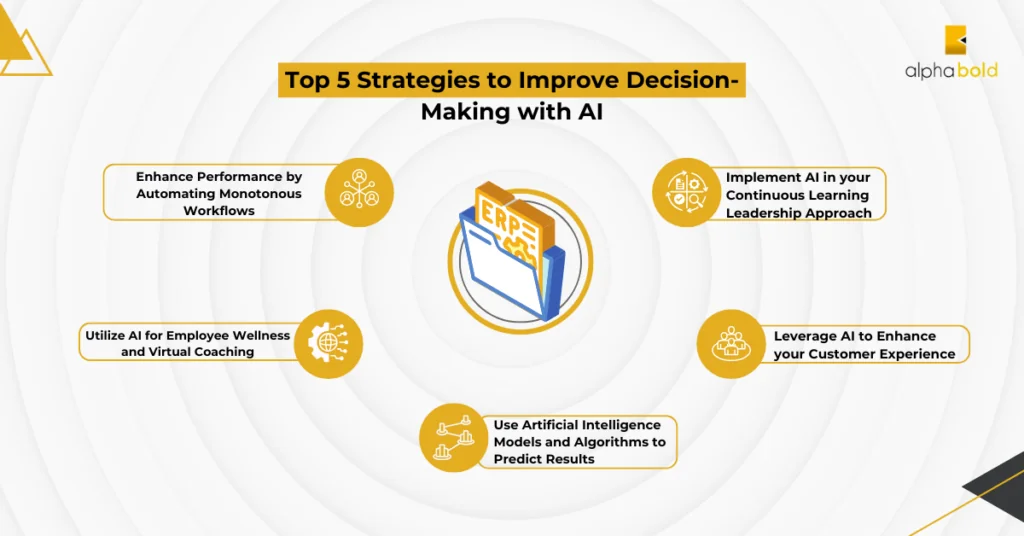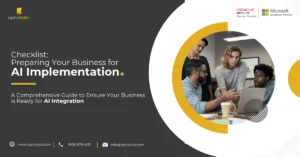Table of Contents
Introduction
Leaders in the healthcare, finance, and manufacturing industries increasingly rely on artificial intelligence (AI) in their decision-making processes, as AI has the largest market share in respective industries. For example, the finance and banking industry alone may be valued at $340 billion using generative AI in the coming years. This blog post will explore how to improve decision-making with AI, what strategies and areas you can implement AI, and how to get optimal use out of it.
The involvement of AI in our lives has reached a point where it’s participating in all aspects of our economy. AI has become an integral part of our business and how we innovate processes. One remarkable capability of AI is how it partners with human intelligence to provide high-quality automated predictions at low-cost investments.
AI add-ons and tools like Microsoft’s Copilot, OpenAI’s ChatGPT, Grammarly, and DataRobot have changed business processes. AI has left human professionals far behind in the race for productivity and many other domains- including the gaming industry, medical diagnosis, and pharmaceutical drug development.
The Increasing Importance of AI in Decision-Making
We as humans have limitations on the amount of information we can process. This slows our learning, scope of understanding data and compromises optimal decision-making. For example, managers are accustomed to their routines and resist change, leading to learning myopia.
Research acknowledges this bias in managerial decision-making resulting from limitations in human brain information processing. Most managers or leaders usually forecast, evaluate, and predict potential solutions using the relevant information disposed at their hands and go for the option that maximizes their economic returns.
Even when decision-makers are involved in large-scale firms’ planning, they often do not make these decisions on rational grounds. Instead, they make decisions using their mental shortcuts, known as heuristics, which only involve a fraction of the data available.
Bounded rationality is another thing highlighted in research that results in failure to achieve consistent optimal solutions in decision-making. This is where AI steps in to help us reach rationality and logic. It can help and support human abilities to improve decision-making with AI. Numerous recent studies have examined how AI supports manual work done by humans across a range of skill and employment levels. For instance, research says:
- Human analysts who employ an AI-based tool anticipate stock prices for financial investments more accurately than those who do not.
- Medical coders who previously performed their work manually could work more productively by utilizing AI solutions using standardized codes in medical records.
- AI helps developers finish 126% more weekly tasks, while customer support representatives utilizing AI handle 13.8% more queries every hour.
This data demonstrates that using AI technology directly by human workers can improve their output and performance.
How AI is Simplifying Data-Driven Decision-Making for Managers
Data is the cornerstone of managerial decision-making. Data-driven decision-making entails managing and utilizing analytics from every aspect of the business, i.e., from consumers to suppliers and contenders. For instance, firms with better productivity and higher market valuations are usually backed by data-driven administration.
AI-based data intelligence and data analytics play a huge role in continuous improvement and R&D processes. Moreover, the general adoption of AI in IT has resulted in effective decision-making processes on both organizational and individual levels. This is because the AI algorithms are now significantly more advanced than before. This is due to three primary reasons:
- First, AI boosts results by drawing conclusions from past data and using self-learning to learn from new data. It can do perceptive tasks that need human-like “intuition” because it can find hidden patterns.
- Second, AI produces very accurate predictions and judgments, and the extensive data and training sessions improve the accuracy of these outcomes.
- Third, models employing AI algorithms may perform better as time passes. These unique qualities allow AI to enhance performance more than humans in most domains, including creative skills and repetitive labor.
Bonus read: 4 Key Steps for Business Leaders to Implement AI
Want Personalized Solutions to Improved Decision-making with AI?
Your AI demands are unique, just like your business. At AlphaBOLD, our expertise is developing tailored AI strategies that support your company's objectives. Schedule a consultation right now and allow us to help you seize new possibilities.
Request a ConsultationTop 5 Strategies to Improve Decision-Making with AI in 2024

Let’s delve into the top five strategies that may help you improve decision-making with AI.
1. Enhance Performance by Automating Monotonous Workflows:
Automation supported by AI can computerize routine tasks using systematic data, reducing time spent on managerial tasks. This gives your workforce and leadership team enough time and space to focus on what matters strategically.
AI-automated workflows allow end-to-end testing, which helps eliminate human biases and errors in business processes. On top of that, you can benefit from the flexibility AI provides in adjusting the output by modifying factors such as rules, events, and actions.
2. Use Artificial Intelligence Models and Algorithms to Predict Results:
If you supply sufficient data to the machine learning algorithm, the AI technology can conduct multifaceted research. The findings of this research can identify any issues with the product we manufacture or suggest the best course of action for client satisfaction or marketing.
Data scientists now have additional time for in-depth analysis since automated machine learning techniques save the time needed to build up data streams and ML processes. While there is always room for improvement, the H2O AutoML system stands out as one of the most developed automated systems in terms of both usability and predictive power.
3. Leverage AI to Enhance your Customer Experience:
Customer relationship management has improved and gained greater flexibility since the inception of AI. Numerous tasks have been automated, such as lead rating, data analysis, handling communications, and data recording. The AI buyer persona model can also forecast a customer’s lifetime value. These qualities facilitate more fluid and effective teamwork among marketing departments.
These methods can also obtain information on the client’s general impression. We can then apply that information to inform our decisions on how to serve our customers better and customize communications so that they feel taken care of. Various technologies like AI chatbots and self-service support systems are now available to enhance current and potential consumers’ engagement.
4. Implement AI in your Continuous Learning Leadership Approach:
AI uses adaptive algorithms to provide continuous learning by offering leaders access to resources, material, and constant input. AI can additionally alter and customize what it suggests based on the needs and goals of various leaders focused on their field of expertise.
Moreover, since AI eradicates human biases, AI-powered continuous learning is more inclusive and more transparent for individuals from diverse backgrounds. AI can better accommodate these people’s different learning styles and comprehension abilities. A few examples of this can be seen in:
- Personalized learning management systems that adapt are flexible with the level of difficulty based on your performance.
- Learning through Virtual and Augmented Reality (VR & AR) that analyzes and stores past experiences and behaviors to recommend better development opportunities based on their preferences and strengths.
5. Utilize AI for Employee Wellness and Virtual Coaching:
When coaching and mentorship programs integrate human and artificial intelligence, leaders are encouraged to use improved decision-making and problem-solving skills. With expertise and intuition, coaches and mentors can leverage AI’s capacity to analyze large volumes of data, spot trends, and offer insightful information.
This helps them add compassion, comprehension, and context to their coaching and successfully support decision-making and problem-solving.
Want to See How AI Solutions can Help your Business Get to the Top?
2024 is the year of AI, and we are here to support you in your AI journey from beginning to end. Our AI consultants at AlphaBOLD have a decade of experience in building AI solutions for companies like yours. Request a consultation today and explore the potential you may reach by investing in the right AI tools.
Request a ConsultationConclusion
If you have read the blog thoroughly, you must know by now that AI is a functional part of our lives. It’s a part of everything, including how we make decisions, communicate, process or comprehend information, and make our lives easier altogether. To stay ahead in this cut-throat business environment, bringing AI to your side and investing in good decision-making AI tools are innovative approaches that will set you up for the future.
Explore Recent Blog Posts









